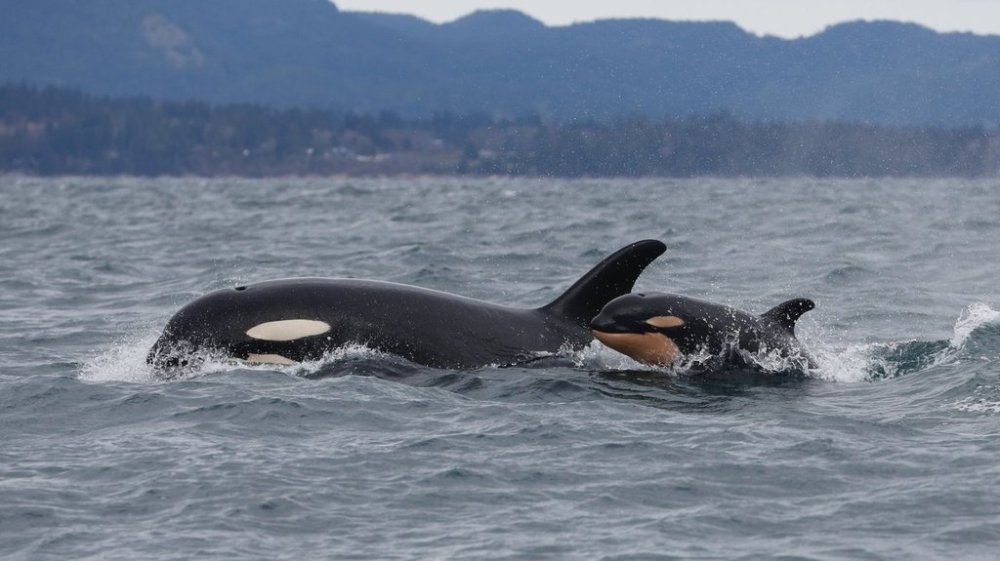Science
Southern Resident Killer Whales Face Decline Without Action

The latest survey of the endangered southern resident killer whales reveals a concerning trend: the population appears to be plateauing and slowly sliding toward potential extinction. Michael Weiss, a director with the Center for Whale Research, highlighted that without stronger protective measures, these iconic marine mammals may not survive in the long term.
The survey, which provides a snapshot of the population as of July 1, indicates a total of 74 southern resident killer whales, reflecting an increase of only one from the previous year. Four births were recorded among the three distinct pods during the census; however, only two of those calves survived. The report also noted the disappearance of K pod’s adult male, known as K26, which Weiss characterized as a “huge loss” for the already vulnerable population.
Weiss attributed the decline to several factors, including the decreasing availability of chinook salmon, pollution, and noise pollution from commercial vessels operating in their habitat along the coasts of Washington state and British Columbia. He warned that while immediate extinction is not imminent, there is a significant risk that at least one of the three pods could vanish within the next 50 years.
Population Dynamics and Genetic Diversity
The situation is further complicated by the genetic health of the population. Weiss noted that the southern resident killer whales are exhibiting low genetic diversity, which is affecting their resilience to diseases. Currently, there are 27 males of reproductive age, but fewer are breeding. The youngest male confirmed to have reproduced is 15 years old, while Weiss believes that prime reproductive age for males is in their early 20s. The loss of K26, the oldest male in K pod, exacerbates these challenges.
Females in the population are reproducing at roughly half the rate of their northern resident counterparts. The mortality rate among calves is alarming, with about 50% not surviving their first year. Weiss noted that K pod, with only 14 members, is in particularly dire straits, having not had a successful birth since 2022, apart from one birth a decade prior.
In contrast, J pod is experiencing a modest increase, attributed to a lower mortality rate among adults in recent years. Still, Weiss cautions that this trend could shift rapidly.
Challenges and Conservation Strategies
A key factor in the dwindling population of southern resident killer whales is their reliance on chinook salmon, which is itself facing decline. Weiss pointed out that these orcas often get the “last crack” at the salmon that migrate from northern waters to rivers along the Pacific coast, competing with other marine mammals and commercial fishing fleets.
To address these challenges, Weiss advocates for restoring salmon habitats, particularly freshwater spawning grounds, and adjusting fisheries to better protect chinook populations. He emphasized the importance of managing fisheries away from ocean waters and estuaries to reduce competition for the dwindling salmon resources.
The urbanization of their habitat further complicates the orcas’ struggle. Weiss described their hunting environment as akin to “trying to find food on a highway,” as cruise ships and freighters traverse their feeding grounds daily.
The survey’s findings, released on October 13, 2025, underscore the urgent need for concerted conservation efforts to prevent the southern resident killer whales from slipping further toward disappearance. As Weiss notes, without significant changes in how we manage fisheries and protect their habitat, these majestic creatures face an uncertain future.
-

 Lifestyle1 month ago
Lifestyle1 month agoWinnipeg Celebrates Culinary Creativity During Le Burger Week 2025
-

 Health2 months ago
Health2 months agoMontreal’s Groupe Marcelle Leads Canadian Cosmetic Industry Growth
-

 Science2 months ago
Science2 months agoMicrosoft Confirms U.S. Law Overrules Canadian Data Sovereignty
-

 Education2 months ago
Education2 months agoRed River College Launches New Programs to Address Industry Needs
-

 Technology2 months ago
Technology2 months agoDragon Ball: Sparking! Zero Launching on Switch and Switch 2 This November
-

 Science2 months ago
Science2 months agoTech Innovator Amandipp Singh Transforms Hiring for Disabled
-

 Technology5 days ago
Technology5 days agoDiscord Faces Serious Security Breach Affecting Millions
-

 Technology2 months ago
Technology2 months agoGoogle Pixel 10 Pro Fold Specs Unveiled Ahead of Launch
-

 Science2 months ago
Science2 months agoChina’s Wukong Spacesuit Sets New Standard for AI in Space
-

 Technology2 months ago
Technology2 months agoWorld of Warcraft Players Buzz Over 19-Quest Bee Challenge
-

 Business2 months ago
Business2 months agoDawson City Residents Rally Around Buy Canadian Movement
-

 Technology7 days ago
Technology7 days agoHuawei MatePad 12X Redefines Tablet Experience for Professionals
-

 Business2 months ago
Business2 months agoNew Estimates Reveal ChatGPT-5 Energy Use Could Soar
-

 Science2 months ago
Science2 months agoXi Labs Innovates with New AI Operating System Set for 2025 Launch
-

 Education2 months ago
Education2 months agoAlberta Teachers’ Strike: Potential Impacts on Students and Families
-

 Technology2 months ago
Technology2 months agoInnovative 140W GaN Travel Adapter Combines Power and Convenience
-

 Technology2 months ago
Technology2 months agoFuture Entertainment Launches DDoD with Gameplay Trailer Showcase
-

 Technology2 months ago
Technology2 months agoGlobal Launch of Ragnarok M: Classic Set for September 3, 2025
-

 Technology2 months ago
Technology2 months agoNew IDR01 Smart Ring Offers Advanced Sports Tracking for $169
-

 Technology2 months ago
Technology2 months agoArsanesia Unveils Smith’s Chronicles with Steam Page and Trailer
-

 Science2 months ago
Science2 months agoNew Precision Approach to Treating Depression Tailors Care to Patients
-

 Technology2 months ago
Technology2 months agoHumanoid Robots Compete in Hilarious Debut Games in Beijing
-

 Business2 months ago
Business2 months agoBNA Brewing to Open New Bowling Alley in Downtown Penticton
-

 Health2 months ago
Health2 months agoGiant Boba and Unique Treats Take Center Stage at Ottawa’s Newest Bubble Tea Shop










